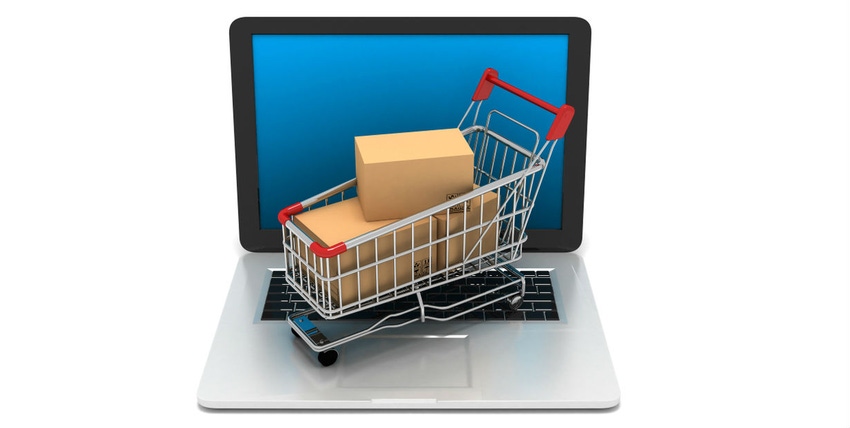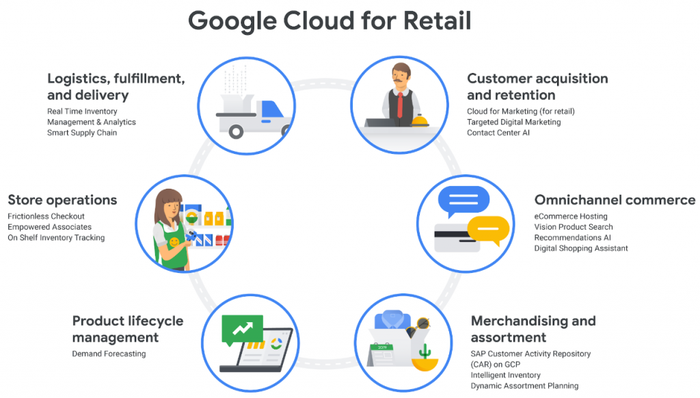At its Next event, Google Cloud rolled out new services aimed at wooing retailers wary of AWS.
April 17, 2019

Google Cloud Platform is throwing out an array new offerings and partnerships integrated with advanced capabilities like artificial intelligence (AI) and data analytics in hopes of making deeper inroads into a retail market that could be a bit more open than others in the fast-growing public cloud space.
At the company’s recent Google Cloud Next 2019 show, CEO Thomas Kurian and other executives put an emphasis on retail, which is being heavily courted by Google and other cloud providers like Microsoft Azure and Oracle Cloud, who note a wariness in some retailers to fully embrace dominant cloud provider Amazon Web Services (AWS).
Google Cloud rolled out its Google Cloud for Retail, a collection of solutions designed to make it easier for retailers to embrace cloud services throughout their operations, from inventory management and logistics and fulfillment to customer acquisition, merchandizing and e-commerce. They also touted the use of AI and machine learning capabilities throughout various solutions and a wide array of technology and SI partnerships with such companies as Salesforce.com, Accenture, Deloitte and SAP to create offerings for retailers.
The offerings come at a time when retailers increasingly are turning to the cloud to help address the growing demand among customers that the on-premises experience be as easy and seamless as the online experience, according to Pravin Pillai, global lead for industry solutions market for retail at Google Cloud.

“These customers are looking for tools that can make recommendations or better help them find what they need,” Pillai wrote in a blog.. “And they want the entire experience to be faster and more personalized than ever. As a result, many retailers are turning to cloud technologies to help meet these needs. … We’ve invested deeply in our solutions for retailers and many take full advantage of Google Cloud’s expertise and innovation in areas like data analytics and AI.”
At the same time, some retailers are looking for an alternative or a complement to AWS, by far the dominant public cloud provider. Part of it is the growing trend among businesses in general to adopting a multicloud approach by using more than one cloud services provider; however, some retailers also see a growing competitor in AWS, given Amazon’s $13.7 billion purchase of national grocer Whole Foods in 2017 and the launch of the highly automated Amazon Go stores, not to mention the e-commerce giant’s impact on book stores over the years.

Endpoint Technologies Associates’ Roger Kay
AWS has a broad range of retail customers and services available to them, but Google Cloud and others see an opportunity to leverage any worries among retailers in hopes of gaining ground in a global public cloud services market that Gartner analysts say will grow to $214.3 billion this year.
“Amazon has been the easiest to work with and there have been a lot of people who use Amazon as their cloud services provider,” Roger Kay, principal analyst with Endpoint Technologies Associates, told Channel Futures. “The problem is a lot of these guys see Amazon as coming after their businesses.”
The relationship between some retailers and AWS has become one of “love-hate” or “frenemies,” Kay said. It’s also become one where, because of AWS’ long shadow over the public cloud space, many retailers can’t …
… live without AWS.
But Google Cloud, Azure and others are making their pitches. Azure earlier this year touted the work it’s doing with both Walgreens and Kroger, the national grocery chain, while also already working with such companies as Walmart and Gap. At Google Cloud Next, Kurian talked about the work Google Cloud is doing with national department store chain Kohl’s in developing a seamless omnichannel retail effort that includes digital, mobile and the more than 1,150 brick-and-mortar stores.
“Kohl’s recognized the opportunity to take on a cloud partner to help drive the improvement of the speed and reliability of their operations, while they focused on a number of innovations to deepen customer experiences,” Kurian wrote in a blog.
Endpoint Technologies’ Kay said that in the long run, the retail business won’t be a huge one for Google Cloud. Kurian, who took over the top spot at Google Cloud late last year after more than two decades at Oracle, has been vocal about the company’s plans to go after more enterprise business, but retail will be part of that effort.
It also will open up more avenues for Google Cloud’s channel partners, he said. Google’s strength is more in developing software rather than managing services and support around infrastructure for customers. Rather than having to manage tens of thousands of customers, it’s easier to work with 10 or 15 major channel partners who can give the support and services that end users need, the analyst said.
Read more about:
VARs/SIsAbout the Author(s)
You May Also Like


